Sensor fusion is a vital part of robotics and autonomous systems. It facilitates the fusion of data from multiple sensors to track non-linear motion and objects in the environment.
If you want to pursue a lucrative career in revolutionary fields such as robotics, possessing robust knowledge of sensor fusion is a must. According to Payscale, average sensor fusion engineers in the US earn as much as $122000 per year, while elite ones make many times more.
You can learn the fundamentals of sensor fusion engineering from online courses. Hence, this article features the best online courses available, which will equip you with the foundational knowledge and practical hands-on experience you can develop further.
Affiliate Disclosure: This article from Victory Tale contains affiliate links. If you purchase one of our selected sensor fusion courses through them, we will receive a small commission from our partners.
Nevertheless, we always value integrity and prioritize our audience’s interests. You can then rest assured that we will present each course truthfully.
Things You Should Know
Prerequisites
Sensor fusion is an advanced concept. You will need to have a solid understanding of the following before taking any course on this list:
Criteria
Below are the criteria for the best sensor fusion courses:
1. Become a Sensor Fusion Engineer
This Nanodegree program from Udacity is unarguably the best option for students looking for comprehensive training. You will learn from a team of veteran engineers who worked at leading companies such as Ford, Volkswagen, and Qualcomm.
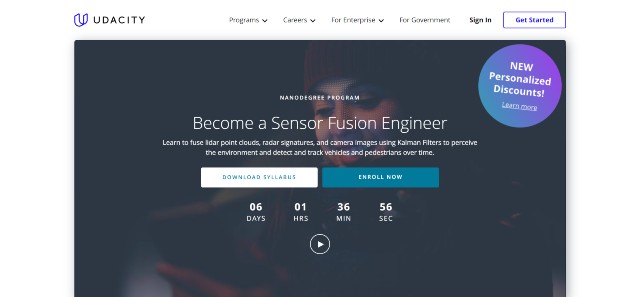
Course Content
Created in collaboration with Mercedes Benz, this program consists of four minor courses as follows:
1. Lidar – The first course will introduce you to Lidar point clouds. You will then work with a simulator to create Point Cloud Data (PCD) and visualize the Lidar data.
Subsequently, you will learn about Point Cloud Segmentation and obstacle clustering. You will use PCL (Point Cloud Library) to segment point clouds and cluster obstacles and implement Euclidean Clustering to find clusters.
The final part of the course will explain how to work with real-world self-driving car PCD. You will filter the data and apply point cloud processing to detect obstacles.
2. Radar – The second course will drill deep into analyzing radar signatures to detect and track objects. You will learn the steps to handle actual radar data and calculate object headings & velocities.
Later, you accurately perform radar calibration and detection tasks. For example, you will apply thresholds and filters to radar data and signatures to mitigate false positives.
3. Cameras – The third course will discuss the role of sensor fusion in autonomous driving. You will compare and contrast various autonomous vehicle sensor sets and use industry-grade performance criteria to compare camera, lidar, and radar.
Next, you use OpenCV to manipulate images and design a collision detection system based on different measurements. You will then detect features from objects and match them to track objects over time.
The final part of the course will detail how to fuse camera images with lidar point clouds data. You will project 3D lidar points into a camera sensor and use deep learning to detect objects in camera images. Finally, you will create a three-dimensional object from lidar and camera data.
4. Kalman Filters – The fourth will be all about Kalman filters. You will build a Kalman filter using C++ to fuse data from different data sources (Lidar and Radar). You will also optimize them to improve tracking accuracy and reduce sensor noise.
Subsequently, you will create and program an extended Kalman filter and unscented Kalman filter to track non-linear motion accurately.
Apart from these informative lessons, each course provides quizzes, assignments, and a real-world project. Thus, you will complete as many as four projects and obtain the necessary hands-on experience in the process.
Since the topics covered in this program are extensive, I recommend downloading a course syllabus to understand what to expect from this course thoroughly.
Student Support
If you have taken some online courses, you may notice that most of them do not provide sufficient student support. However, that is not the case with Udacity. Once you enroll in the program, you will be able to access three types of student support as follows:
Technical Mentor Support – Udacity mentors are available 24/7 to help solve technical problems. You can access them by using the chat interface on Student Hub.
Most students receive a reply within an hour. Hence, you can be confident that you will never get stuck in specific coding assignments and wait endlessly for an instructor’s response.
Project Reviews – Udacity will provide feedback on your project and additional tips and tricks upon request.
The best thing is that you can send unlimited review requests. Therefore, you can send them at any time without the need to reach a specific milestone.
You will receive feedback within 1-3 hours, which is extremely fast. You can then effectively create a feedback loop that streamlines your learning.
Career Services – The career services team will review your resume, LinkedIn profile, and Github portfolio (if available) to ensure that they meet professional standards. This support can be constructive in receiving interview invitations from prestigious companies.
Overall, such support rivals those provided by programming bootcamps. Hence, you will be confident that you are in good hands.
Pricing
This program costs $399 per month. However, you can opt for a 4-month bundle, which will reduce the average monthly tuition fees to $339 (or a 15% discount).
Furthermore, you can create a Udacity account to access personalized discounts, as I do below.
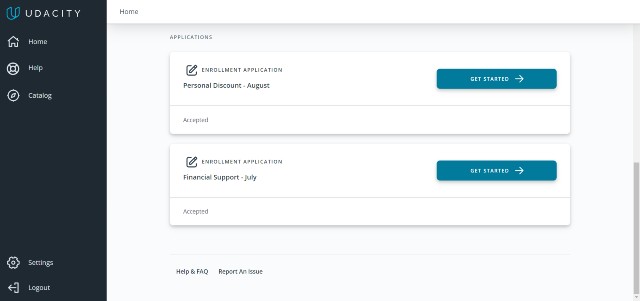
These discounts can be as high as 75%, so you can practically enroll in the program by paying less than $100 per month.
[sc name=”udacity” ][/sc]Pros & Cons
Pros
- Unarguably the best sensor fusion course available online
- Taught by a team of veteran engineers
- Well-structured curriculum (created in collaboration with a world-renowned car company)
- Informative and in-depth lessons covering all key concepts and applications
- Include four real-world projects for students to gain hands-on experience
- Timely technical support & Unlimited Project Reviews
- Career Services is a big plus.
Cons
- Expensive compared to other sensor fusion courses
- Udacity’s projects can be challenging for some students.
2. Sensor Fusion and Non-linear Filtering for Automotive Systems
Course 2 is from Chalmers University of Technology, a leading Swedish research university.
This edX program will introduce you to fundamental concepts of sensor fusion and non-linear filtering for automotive perception systems. Also, you will learn how to use different sensors to estimate parameters of interest recursively.
Note: You will use MATLAB extensively in this course. Thus, you should be familiar with it before enrolling.
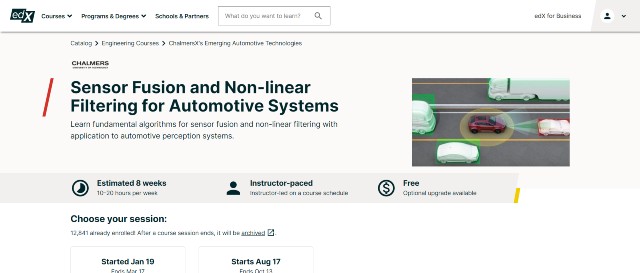
Course Content
The following are the topics that you will learn in this course:
- Bayesian Statistics and Recursive Estimation Theory
- Common sensors, measurements, and how to model them
- Motion models used for positioning
- Kalman Filter (KF)’s essential properties
- Non-linear filtering
- and many more
Finally, you will use all the knowledge you have learned to build a sensor fusion toolbox.
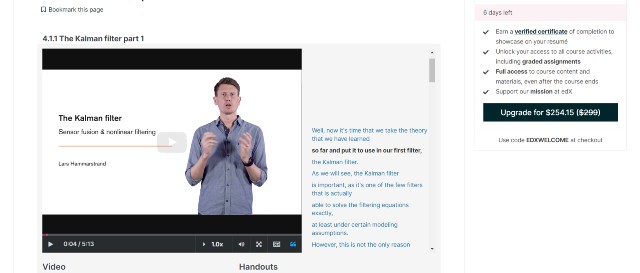
Regarding the pace, Chalmers recommends spending 10-20 hours per week, and you will complete the course in 8 weeks.
According to this information, the weekly workload is undoubtedly intense. In addition, the course is instructor-led, so you will have to submit all assignments on a fixed date.
Therefore, if you are interested in this program, you should ensure that you have sufficient time to complete it beforehand. Otherwise, you will pay course fees to no avail.
Pricing
You have three enrollment options as follows:
First, you can audit this program. Auditing is entirely free. However, you will not be able to access graded assignments and a digital certificate.
Second, you can enroll in the verified track of this course separately. This option costs $249 and provides complete access to the course.
Finally, you can opt for a full-fledged Emerging Automotive Technologies Micromaster program, which costs $1613.70 one-time. However, it will provide full access (like a verified track) to all seven courses in the program, including the one I discussed above.
If you are determined to become a sensor fusion engineer for the automotive industry or want a more comprehensive learning experience, this option will be optimal.
Pros & Cons
Pros
- Learn from faculty members of a leading Swedish university
- In-depth and informative lessons
- Packed with hands-on assignments and quizzes to help you strengthen your skills
- All videos are downloadable.
- Easy-to-follow transcripts
- Free auditing
Cons
- Requires an extremely high weekly commitment (10-20 hours per week)
- Not self-paced. You have to submit assignments on time to receive completion certificates.
- Not always available (You can take it only during some parts of the year.)
3. Advanced Kalman Filtering and Sensor Fusion
This Udemy course is an excellent choice if you want to learn more about Kalman filters and implement them with C++. You will learn from Steven Dumble, a GN&C engineer with more than 15 years of experience in engineering and software development.
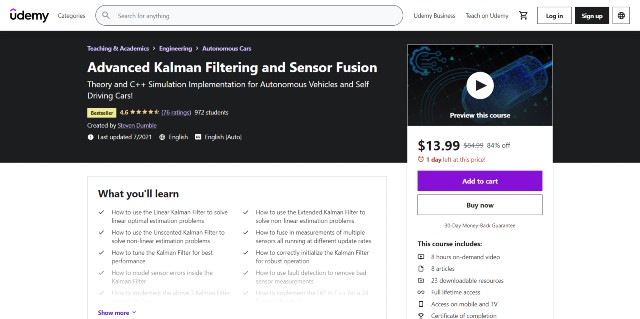
Course Content
The sole objective of this course is to implement three variants of Kalman filters for autonomous vehicles. Below is a summary of what you will learn from this 8-hour course.
- Set up C++ Development Environment
- Introduction to Sensor Fusion, Data Fusion, and Kalman filters
- Mathematical background (Probability concepts, Linear Transformations of Uncertainties, Discrete vs. Continuous, etc.)
- Linear Kalman Filter
- Extended Kalman Filter
- Unscented Kalman Filter
- How to use Kalman Filter variants to solve estimation problems
- How to handle faulty data, sensor biases, and other errors
- and many more
Apart from video lessons, the course will provide various learning materials, including cheat sheets with important notes and all the source code. Thus, you will have all the resources to self-study smoothly.
Reviews: 4.6/5.0, 970+ students
Pros & Cons
Pros
- Learn from a subject-matter expert
- Well-structured curriculum
- Clear explanations with easy-to-understand examples
- Provide students with opportunities to implement Kalman filters in real life
- Lifetime Access + 30-day money-back guarantee
- Inexpensive ($20 or lower when on sale)
Cons
- The instructor has not yet provided lecture slides for students to download.
Other Alternatives
As of now, there are very few sensor fusion courses. One of the reasons is that the field has not matured. I will update this post once I have found new, compelling courses.
Related Courses
Below are links to lists of online courses that you may find helpful for further study once you have completed sensor fusion courses.
Self-driving cars – Once you master sensor fusion, you should continue your journey by learning how self-driving cars work. These courses will equip you with the essential skills required for a self-driving car engineer position.
Machine Learning – Machine Learning is instrumental for creating self-driving cars, thus a must-have skill for self-driving car engineers.
Computer Vision – Computer Vision is a field of study that focuses on training computers to perceive the surrounding environment, thus another required skill to master for future sensor fusion engineers.
Drone Robotics and Autonomous flight Engineer – Coming Soon